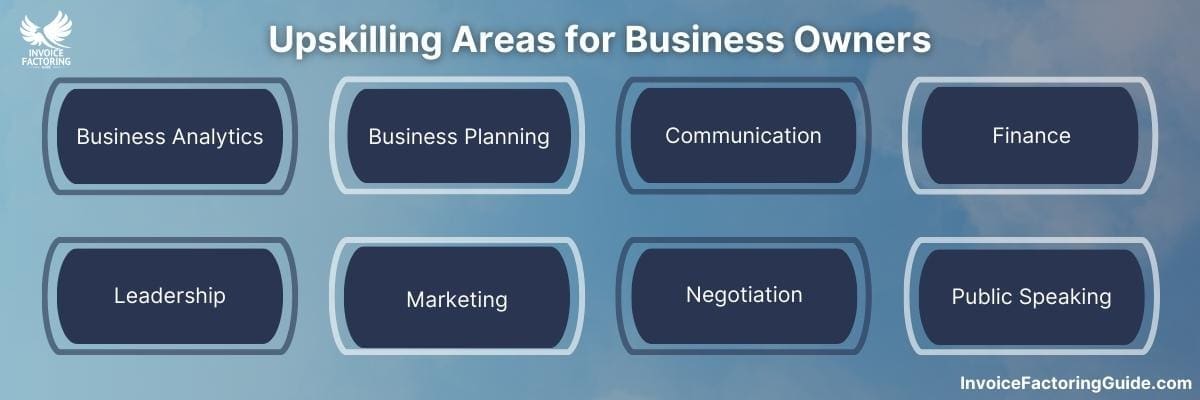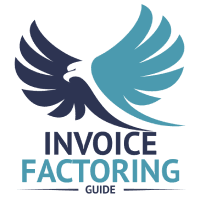
You may not have the time or need to go back to school, but as a small business owner, there are many reasons to upskill and just as many ways to do it affordably. On this page, we’ll explore budget-friendly ways small business owners can upskill and provide a few examples in each category to help streamline your search.
The Importance of Upskilling for Small Business Owners
- Demand: The number of skills required to perform a single job increases ten percent annually, according to Gartner. Because most small business owners perform multiple jobs, it’s that much more important to stay on top of things.
- Results: The more skills you possess, the better your business outcomes will likely be.
- Confidence: Upskilling can help you build confidence, which can be especially helpful for those coping with imposter syndrome.
Upskilling Areas for Business Owners
Any area in which you have a known skill gap or don’t feel confident about can present learning opportunities. Some areas business owners often upskill in include:
- Business Analytics
- Business Planning
- Communication
- Finance
- Leadership
- Marketing
- Negotiation
- Public Speaking

11 Budget-Friendly Ways to Upskill as a Small Business Owner
If you’re hungry for knowledge, there are lots of free and low-cost ways to upskill.
1. Blogs
Blogs provide small bites of information you can digest in just a few minutes and are always available. Some blogs for small business owners include:
- Accenture Voices of Change
- Forbes Entrepreneurs
- Invoice Factoring Guide Insights
- McKinsey Strategy & Corporate Finance Blog
- SBDC Small Business Blog
2. Books

Whether you’re ready for a deep dive on a topic, focused on self-improvement, or want to catch the classics for talking points, books are an excellent way for small business owners to upskill. Those on a budget can often save with e-books or purchase secondhand books, plus your local library is likely to offer many titles free. A few popular books for small business owners include:
- “The 7 Habits of Highly Effective People: Powerful Lessons in Personal Change” by Stephen Covey
- “The Art of War” by Sun Tzu
- “Digital Marketing Outsourcing: The Ultimate Recipe for Growing Your Business Online” by Husam Jandal
- “The Effective Executive” by Peter F. Drucker
- “How to Win Friends and Influence People” by Dale Carnegie
3. Online Courses
Want to pick up a certification or need more visual aids to retain what you’re learning? Take an online course. Many popular platforms offer a selection of free online courses for small business owners. A few examples include:
4. YouTube
Whether you want to get inspired, catch the latest news, or learn from other entrepreneurs, you’re likely to find a YouTube channel that can help. A few popular YouTube channels for small business owners are:
5. Podcasts
Podcasts are fantastic because you can catch up in the gym, while driving, and anytime you’re on the go. Some popular podcasts for small business owners include:
- The B2B Growth Show
- The Customer Experience Podcast
- In the Arena
- Sales Hacker Podcast
- Talent Acquisition Trends & Strategy
6. Webinars
Live webinars offer the opportunity to learn and engage with the host so you can get all your questions answered. Some companies that produce webinars for small business owners on a variety of topics include:
- American Express Business Class for Merchants
- National Federation of Independent Business (NFIB) Webinars
- Small Business Trends Business Webinars and Videos
- Tory Burch Foundation
- Verizon Small Business Webinar Series
7. Forums, Online Communities, and Meetups
Peer-to-peer networking is invaluable. It can help you feel connected to others and stave off the loneliness many entrepreneurs face, allow you to learn from others who run businesses like yours, and allow you to share your expertise. Some general small business communities and meetup opportunities are provided below. Searching the larger networks for groups related to your industry, interests, or demographics is also a good idea.
8. Professional Organizations
Professional organizations are usually tailored to an industry or demographic. If you’re unsure which might be a good fit or what to look for, check Facebook and LinkedIn groups. This will allow you to connect with your peers. Most offer additional resources, such as workshops and webinars, too.
9. Mentorships
Mentorships are valuable for both the mentor and mentee. As a mentee, you gain access to a professional who can help guide you and provide insights on improving your business or self. As a mentor, you can improve your communication, self-awareness, and self-confidence. Some platforms that entrepreneurs can use to establish a mentor relationship include:
10. The SBA
The U.S. Small Business Administration (SBA) offers a wealth of resources for small business owners. Most educational resources are entirely free and available online.
11. Your Partners and Vendors
Make a list of all your vendors and any company your business partners with, then visit their website to see what’s available. You’ll likely find educational resources that can help you maximize the value of the products and services your company leverages. Some take their educational opportunities a step further and cover a variety of topics. A few popular companies that offer free resources for small business owners include:
Keep Learning with Invoice Factoring Guide
For business insights, tips, and additional educational materials, you bookmark Invoice Factoring Guide’s Insights section. It’s updated regularly to provide you with the latest information. You can also check out our Comprehensive Guide to Invoice Factoring to learn more about how factoring works, or, to be matched with a factoring company that offers competitive rates and specializes in your industry, request a complimentary rate quote.

About Invoice Factoring Guide
Related Insights
Get an instant funding estimate
Results are estimates based on the calculated rate and the total invoice amount provided.
Actual rates may vary.
Request a Factoring Rate Quote
PREFER TO TALK? Call us at 1-844-887-0300










